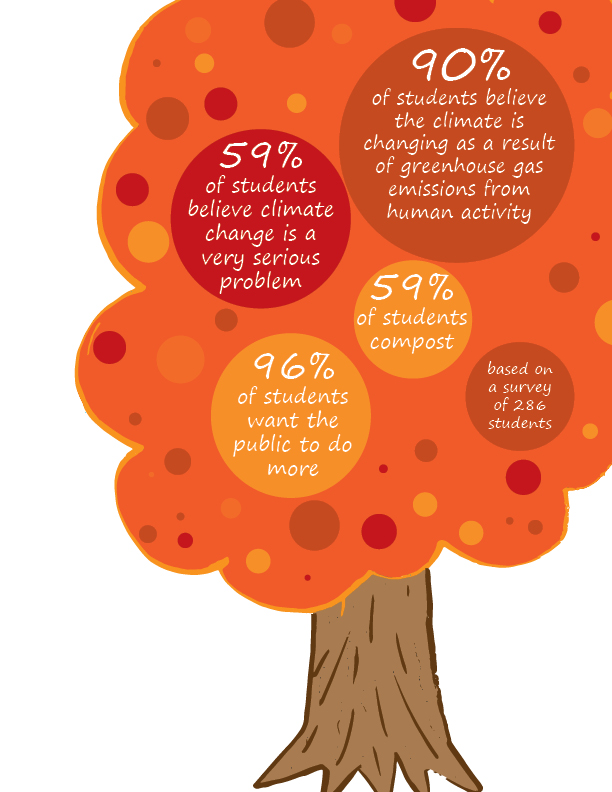Our environment, our responsibility
Rising temperatures, melting ice caps, droughts, forest fires, and skyrocketing carbon emissions—our climate is changing, and protecting the environment has become of paramouont importance. In the face of this massive problem, what can Liberty students do? How serious is the worldwide environmental problem? And is there still hope for the world?
November 9, 2017
Most of Liberty’s students are aware of the importance of a healthy environment. In fact, 97% of Liberty students believe the climate is changing, and 93% of students believe the government should do more to combat climate change. These statistics may be thanks to the abundance of information supporting climate change and harmful impacts of humans on the environment. “All the data we have to date supports the idea that the climate is changing,” physics and AP Chemistry teacher Eleonor Schneider said. And this data has shown that the changing climate is having detrimental impacts in the form of harsher hurricanes, wildfires, and droughts.
In the Northwest, the impacts of climate change can already be seen in higher temperatures, shrinking glaciers, and increasing numbers of forest fires. According to the 2013 Northwest Climate Assessment Report published by the Oregon Climate Change Research Institute, the changing climate of our region will continue to impact environmental health in decades to come.
“The negative impacts of climate change outweigh any positive ones. Increasing temperatures, changing precipitation patterns, and the possibility of more extreme weather could increase morbidity and mortality due to heat-related illness, extreme weather hazards, air pollution and allergenic disease exacerbation, and emergence of infectious diseases,” the report said.
Amy Snover, director of the Climate Impacts Group at the University of Washington, was an editor of that report. She stresses that the changing climate, and the impacts that come with it, are largely the result of human activity.
“When climate scientists look [at recent changes in climate], the only way they can explain those changes is if they include the effect of humans and greenhouse gases,” Snover said.
As the evidence shows, climate change is a major issue with a multitude of repercussions, and the magnitude of the problem may feel overwhelming. In light of this, how can students approach the issue? And can individual acts really make a difference?
Recognizing how vast the climate change problem is, Liberty’s science teachers recommend helping in any way possible.
“I always tell people to start small, because it’s overwhelming. When you look at everything, it seems like the world’s ending and it’s all a disaster,” chemistry and AP Environmental Science teacher Tracy Dennis said.
“But you don’t have to save the world in one day. You pick one place or one passion or something that interests you and start there. I think that’s my best advice to people, just start small,” Dennis said.
Likewise, Heidi Roop, the Strategic Communications Lead for the Climate Impacts Group, advocates for making lifestyle changes in areas such as transportation, diet, and consumption.
“One thing people can do is have conversations about ‘what is my impact? Where are there places where I can make small incremental changes?’, like opting to ride a bike, or buy clothes secondhand. Those are all small individual actions, and they certainly add up,” Roop said.
Similarly, Schneider also encourages individual action but stresses that working together is even more important for helping the environment.
“Vote. You need to vote. We can all make small differences individually,” Schneider said. “But when we get the vast majority of the people on the planet all working together, that will give us our best chance to make an impact in a positive way. We’re already making an impact, of course.”
Roop agrees that political engagement is one of the most important ways to make a difference.
“It’s important to stay engaged locally and regionally and make sure you know who’s making decisions for you and creating our future, because it’s our future, and we should use our voices to make sure it’s what we want,” Roop said.
Snover believes that we can prepare ourselves for what’s coming in the future, but only if we stay informed and take action.
“The climate is changing and will continue to change as a result of our activities,” Snover said. “We can prepare for those changes. We have it in our power to reduce those risks both by assessing how much climate change happens in the first place and by preparing for the changes that have been set in motion so that they don’t catch us unaware when they happen.”



